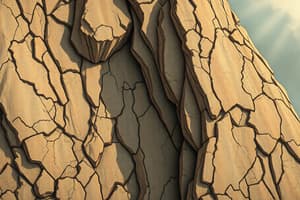Podcast
Questions and Answers
What is the main process involved in chemical weathering?
What is the main process involved in chemical weathering?
- Altering internal structures of minerals (correct)
- Shifting rocks from one place to another
- Creating new minerals from scratch
- Breaking rocks into smaller pieces
What is the result of minerals reacting with water, oxygen, and carbon dioxide on the earth's surface?
What is the result of minerals reacting with water, oxygen, and carbon dioxide on the earth's surface?
- Complete destruction of the minerals
- No change in the minerals
- Formation of new and different minerals (correct)
- Erosion of the existing minerals
How do minerals change during chemical weathering?
How do minerals change during chemical weathering?
- They gradually change at the surface until they reach equilibrium with the environment (correct)
- They completely disintegrate into smaller particles
- They become resistant to any further change
- They transform into entirely different minerals
What is the restriction on the use of the e-content provided in the text?
What is the restriction on the use of the e-content provided in the text?
What happens to the original rock during chemical weathering?
What happens to the original rock during chemical weathering?
What is the primary factor responsible for altering the internal structures of minerals in chemical weathering?
What is the primary factor responsible for altering the internal structures of minerals in chemical weathering?
What happens to minerals that crystallized deep underground when they are exposed to the earth's surface conditions?
What happens to minerals that crystallized deep underground when they are exposed to the earth's surface conditions?
What is the ultimate outcome of the transformation of original rock during chemical weathering?
What is the ultimate outcome of the transformation of original rock during chemical weathering?
What happens to the products of chemical weathering when they come into equilibrium with the surrounding conditions?
What happens to the products of chemical weathering when they come into equilibrium with the surrounding conditions?
What is the primary reason for the gradual change in minerals at the surface during chemical weathering?
What is the primary reason for the gradual change in minerals at the surface during chemical weathering?
Flashcards are hidden until you start studying
Study Notes
Chemical Weathering
- The main process involved in chemical weathering is the reaction of minerals with water, oxygen, and carbon dioxide on the Earth's surface.
- When minerals react with water, oxygen, and carbon dioxide, they break down and change into new compounds.
- During chemical weathering, minerals undergo a change in their internal structure, leading to a transformation of the original rock.
- The primary factor responsible for altering the internal structures of minerals is the exposure to water, oxygen, and carbon dioxide.
- Minerals that crystallized deep underground undergo a significant change when they are exposed to the Earth's surface conditions, becoming less stable and more susceptible to chemical weathering.
- The ultimate outcome of the transformation of original rock during chemical weathering is the formation of new minerals, soils, and sediments.
- When the products of chemical weathering come into equilibrium with the surrounding conditions, they may be transported away or deposited in a new location.
- The primary reason for the gradual change in minerals at the surface during chemical weathering is the constant interaction with the environment, leading to a continuous cycle of transformation.
Studying That Suits You
Use AI to generate personalized quizzes and flashcards to suit your learning preferences.




